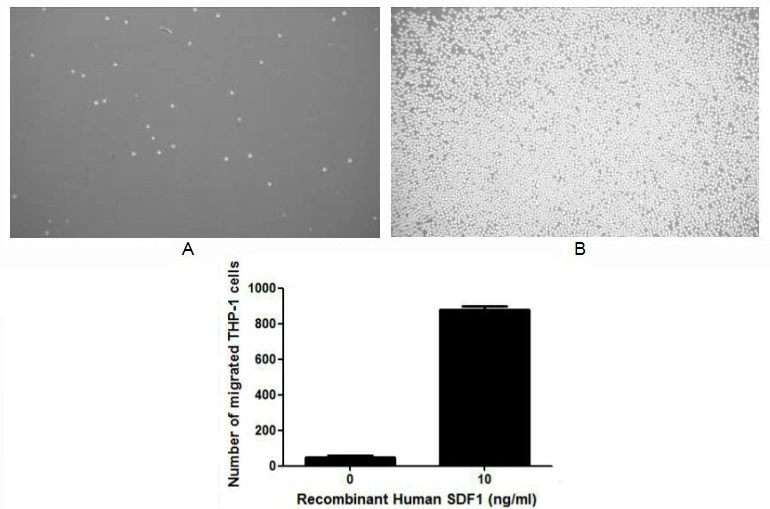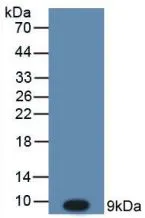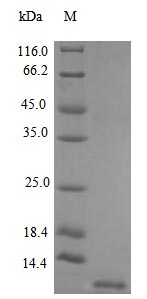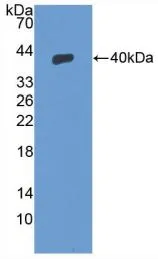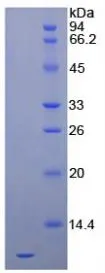
SDS-PAGE analysis of GTX00098-pro Human SDF1 protein (active).
Human SDF1 protein, His tag (active)
GTX00098-PRO
ApplicationsFunctional Assay
Product group Proteins / Signaling Molecules
Protein IDP48061
Overview
- SupplierGeneTex
- Product NameHuman SDF1 protein, His tag (active)
- Delivery Days Customer9
- Application Supplier NoteSDF1 (stromal cell-derived factor 1), also known as C-X-C motif chemokine 12, is a chemokine protein that has chemotaxis active on T-lymphocytes and monocytes. It is thought that SDF1 stimulates migration of monocytes and T-lymphocytes through its receptors, CXCR4 and ACKR3; thus, chemotaxis assay used 24-well microchemotaxis system was undertaken to detect the chemotactic effect of SDF1 on the human monocytic cell line THP-1. Briefly, THP-1 cells were seeded into the upper chambers (100 microl cell suspension, 1x106 cells/ml in RPMI-1640 with 0. 5% FBS) and SDF1 (10 ng/ml, 30 ng/ml and 60 ng/ml diluted separately in serum free RPMI-1640) was added in lower chamber with a polycarbonate filter (8microm pore size) used to separate the two compartments. After incubation at 37C with 5% CO2 for 3h, the filter was removed, then cells in low chamber were observed by inverted microscope at low magnification (x100) and the number of migrated cells were counted at high magnification (x400) randomly (five fields for each filter). The migrated THP-1 cells in low chamber at low magnification (x100) randomly, and the migrated cells were counted at high magnification (x400). SDF1 is able to induce migration of THP-1 cells, and the optimum chemotaxis of SDF1 occurs at 10-60 ng/ml.
- ApplicationsFunctional Assay
- CertificationResearch Use Only
- ConjugateUnconjugated
- Gene ID6387
- Target nameCXCL12
- Target descriptionC-X-C motif chemokine ligand 12
- Target synonymsIRH, PBSF, SCYB12, SDF1, TLSF, TPAR1, stromal cell-derived factor 1, chemokine (C-X-C motif) ligand 12, intercrine reduced in hepatomas, pre-B cell growth-stimulating factor
- Protein IDP48061
- Protein NameStromal cell-derived factor 1
- Scientific DescriptionThis antimicrobial gene encodes a stromal cell-derived alpha chemokine member of the intercrine family. The encoded protein functions as the ligand for the G-protein coupled receptor, chemokine (C-X-C motif) receptor 4, and plays a role in many diverse cellular functions, including embryogenesis, immune surveillance, inflammation response, tissue homeostasis, and tumor growth and metastasis. Mutations in this gene are associated with resistance to human immunodeficiency virus type 1 infections. Multiple transcript variants encoding different isoforms have been found for this gene. [provided by RefSeq, Sep 2014]
- Storage Instruction-20°C or -80°C,2°C to 8°C
- UNSPSC41116120
- SpeciesHuman

